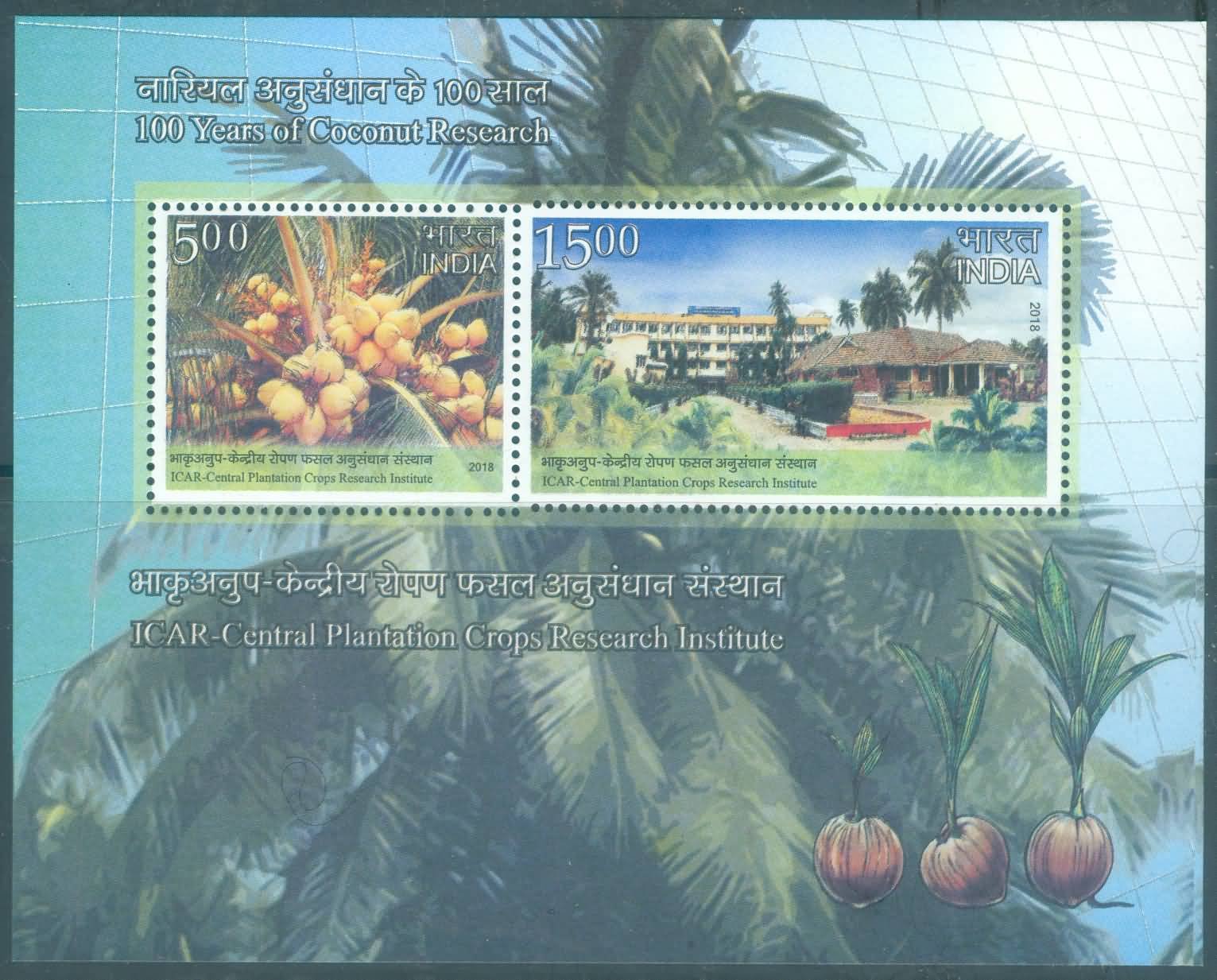Centenary of Indian Council of Agricultural Research

Technical Data
| Date of Issue | January 8, 2018 |
|---|---|
| Denomination | Rs. 20 |
| Quantity | 110,000 |
| Perforation | 13½ x 13½ |
| Printer | Security Printing Press, Hyderabad |
| Printing Process | Wet Offset |
| Watermark | No Watermark |
| Colors | Multicolor |
| Credit (Designed By) | Mr. Suresh Kumar Ms. Nenu Gupta |
| Catalog Codes |
Michel IN BL184 Stamp Number IN BF171 Stanley Gibbons IN MS3454 |
| Themes | Agriculture | Anniversaries and Jubilees | Buildings | Fruits and Berries | Nuts | Plants (Flora) |
ICAR – Central Plantation Crops Research Institute (ICAR-CPCRI): A Century of Excellence in Plantation Crop Research
The Indian Council of Agricultural Research – Central Plantation Crops Research Institute (ICAR-CPCRI), Kasaragod, marks a monumental milestone as it celebrates 100 years of dedicated research and service in the field of plantation crops. Established in 1916 as the Coconut Research Station, the Institute has made outstanding contributions towards the scientific advancement and sustainability of major plantation crops — coconut, arecanut, and cocoa.
Origins and Evolution
The Coconut Research Station was founded in 1916 at Kasaragod, Kerala, by the Madras Presidency, to address the challenges faced by the coconut industry. In 1948, the station was taken over by the Indian Central Coconut Committee (ICCC), laying the foundation for organized coconut research in India.
In 1970, the ICAR–Central Plantation Crops Research Institute (ICAR-CPCRI) was established under the National Agricultural Research System (NARS) by merging:
- Central Coconut Research Station, Kasaragod
- Central Arecanut Research Station, Vittal
- Five substations at Padegon, Kannara, Hirehalli, Mohitnagar, and Kahikuchi
This integration created a unified national research centre focusing on the genetic improvement, production technologies, and sustainability of plantation crops.
Regional Expansion and Specialized Centres
The Institute expanded its reach through several regional stations and research centres across India:
- Central Coconut Research Station (CCRS), Kayamkulam:
Originating from the Agricultural Research Laboratory established in 1937 at Kollam, the centre officially became part of ICAR-CPCRI in 1970 and continues to serve as a key hub for plant protection research in coconut. - Central Arecanut Research Station (CARS), Vittal:
Founded in 1956 following the recommendations of the ICAR Adhoc Arecanut Committee (1947), CARS became part of ICAR-CPCRI in 1970, strengthening arecanut research. - Research Centre, Kahikuchi (Assam):
Established in 1959 and merged with CPCRI in 1973, this centre focuses on region-specific arecanut research in the Northeast. - Research Centre, Mohitnagar (West Bengal):
Set up in 1958 and merged with CPCRI in 1970, this centre supports arecanut and coconut development in eastern India. - Research Centre, Kidu (Karnataka):
Initially established as a Seed Farm in 1972 to produce genetically superior planting material, Kidu became a full-fledged research centre in 2002. It also houses the International Coconut Gene Bank for South Asia (ICG-SA), established in 1998 under COGENT, preserving vital coconut genetic resources. - Minicoy Centre (Lakshadweep):
Established in 1976, this centre has played a vital role in enhancing fruit and vegetable production in the islands. After several administrative transitions, it now serves as a demonstration-cum-production centre under CPCRI.
Coordinated Research and National Impact
The All India Coordinated Coconut and Arecanut Improvement Project (AICCAIP) was initiated in 1972 with its headquarters at CPCRI, Kasaragod. In 1986, it evolved into the All India Coordinated Research Project on Palms (AICRP) — currently operational at 21 centres in 12 State Agricultural Universities and one Central Institute.
Over the decades, CPCRI has nurtured the growth of several allied institutes, including:
- ICAR–Central Coastal Agricultural Research Institute
- ICAR–Indian Institute of Spices Research
- ICAR–Directorate of Cashew Research
Research Achievements and Innovations
ICAR-CPCRI has consistently delivered pioneering achievements in plantation crop science:
- Development of high-yielding varieties of coconut, arecanut, and cocoa.
- Introduction of biotechnological and bio-control methods for pest and disease management.
- Innovative production and cropping system models for sustainable productivity.
- Design of farm mechanization technologies for pre- and post-harvest operations.
- Development of value-added products boosting farmer income and rural entrepreneurship.
Through continuous outreach and technology transfer initiatives, CPCRI has effectively bridged the gap between research and field application, empowering farmers and stakeholders nationwide.
Recognition and Legacy
In recognition of its outstanding contributions to agricultural research and rural development, ICAR conferred the “Sardar Patel Outstanding Institution Award” on CPCRI in 2002.
Today, ICAR-CPCRI stands as a pioneer in plantation crop research, leading India to become a global leader in coconut and arecanut production. As it celebrates a century of excellence, the Institute continues to uphold its commitment to innovation, sustainability, and service to farming communities.

Leave a Comment
You must be logged in to post a comment.